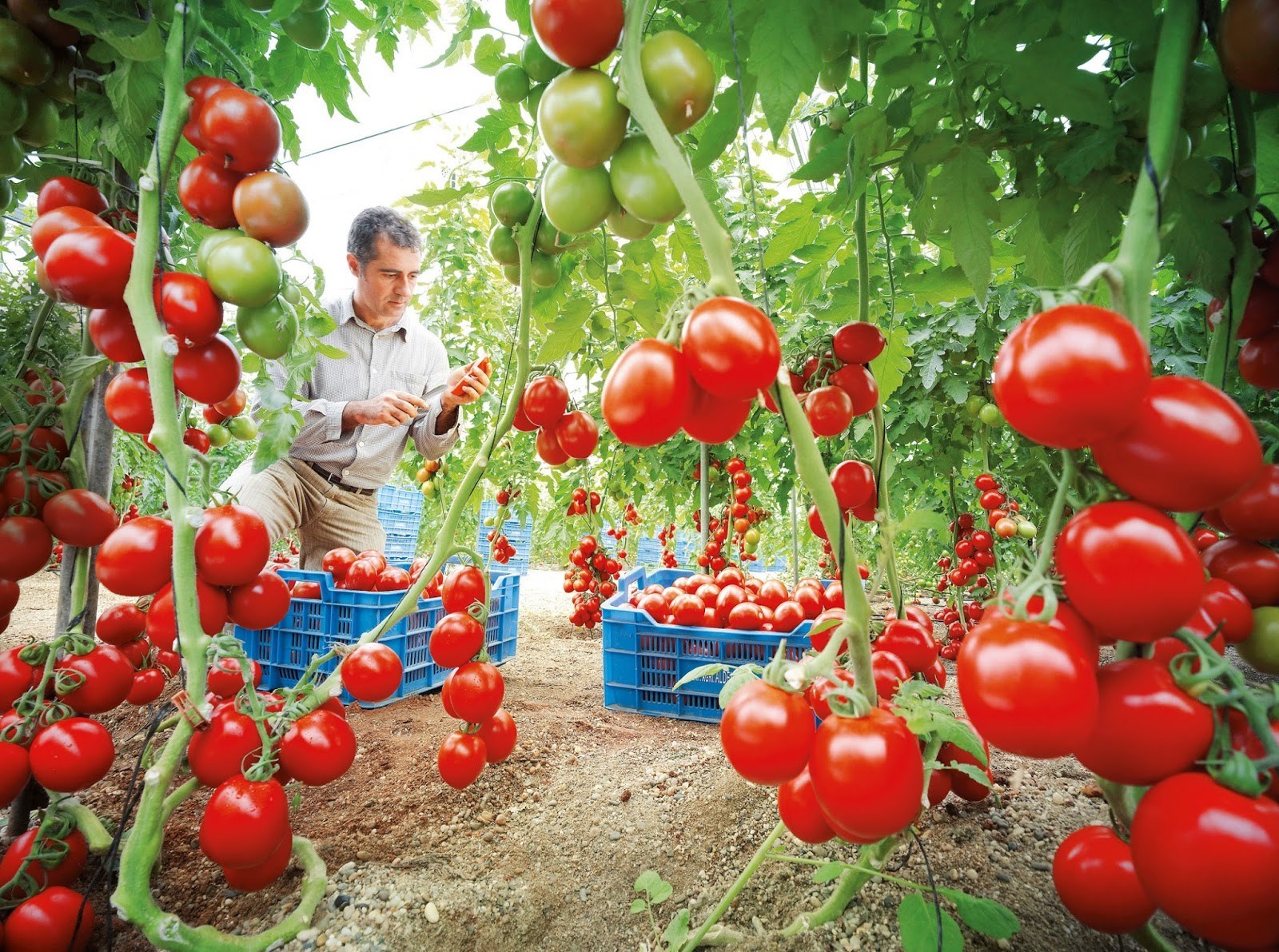https://cdn.steemitimages.com/DQmWzttNwTgcSEJp1xUfQusaTbiFaJA2WNLGLCYNYKwVMQZ/tomate1.jpg
[source](https://i0.wp.com/www.lahuertinadetoni.es/wp-content/uploads/2016/03/tomate1.jpg?fit=1600%2C1191&ssl=1)

Friends of @steemit, there are hundreds of types of tomatoes: small cherry tomatoes the size of a grape, huge bull's heart tomatoes weighing 600-800 grams, succulent for salads and meaty pastries, campari and cream. These are just the most famous varieties. The color of the fruit, in addition to red, can vary from white, orange, yellow, green to purple and chocolate. An annual shrub reaches a height of 60-90 centimeters, at the tips of the branches instead of the leaves: buds. Fruits ripen, as a rule, all at once, and after ripening, the plant dies. A perennial tomato is a climbing plant that requires support with stakes or cages. Such a tomato will bear fruit until it freezes. The fruit generally ripens later than that of an annual plant, but generally provides higher yield. The flower is usually found in the main branches. The height reaches 1.5-3 meters, provided the plant is constantly supported and curly. Ripe tomatoes have a pretty rich aroma. If there is no smell, chances are that the tomatoes have been harvested without ripening. The peduncle should be small. When choosing tomatoes, you should pay attention to the smoothness of the skin, the absence of cracks, spots and traces of bumps. A fully ripe tomato is soft and elastic, but you can only choose it if consumed immediately. Tomatoes that are too ripe are always good for sauces and soups. In healthy fruits, the skin is thin and the meat is smooth. The storage conditions of a tomato directly depend on how ripe it is. The ambient temperature will accelerate the ripening process. Therefore, if you want the tomato to ripen, do not hesitate to leave it hot. Ripe tomatoes are best stored at about 12 degrees Celsius. At this temperature, the tomato will stop ripening, but will not lose its flavor and healthy properties. The tomato has in its composition a set of elements that have a beneficial effect on the cardiovascular system and help cleanse the body. Tomato is an important source of lycopene (a powerful antioxidant that has an immunostimulatory and antitumor effect, slows the aging of the body) and glutathione (a substance that protects cells from toxic free radicals). Due to these properties, tomato is an indispensable product in any balanced diet, as well as in a low fat diet, cancer diet, etc. Lycopene is a component due to which the tomato turns red. Consequently, the redder the tomato, the more this substance contains. This microelement has properties similar to beta-carotene (found in carrots), namely an anticancer effect. Tomato is recommended for people diagnosed with osteoporosis, menopause or bone fragility. Lycopene reduces the risk of developing certain types of cancer, such as prostate, stomach, bladder and uterine cancer. It is found in fresh tomatoes, but it is especially abundant in tomatoes that have undergone a heat treatment, since the cooking process helps to release lycopene and improve its absorption in the body. Glutathione, has the properties of a powerful antioxidant, helps eliminate free radicals that cause many diseases. A large amount of glutathione is found in the skin of many vegetables, so it is useful to eat a tomato in its raw form, in salads. This is a very important element that eliminates toxins, especially heavy metals (which, when accumulated, lead to a deterioration of the body). Tomato and ketchup help reduce the risk of prostate cancer. This effect is observed due to the antioxidant properties of tomato. It is believed that lycopene and glutathione bind to prostate tissue and, therefore, reduce the risk of damage to your DNA. Tomatoes are rich in potassium. This trace element is involved in the exchange of fluids in the body and is also responsible for the health of the nervous system, heart and muscles. Potassium, like calcium, is very abundant in tomatoes. Due to the presence of water and many minerals, tomato is recommended as a means to restore the normal amount of fluids in the body during dehydration. Vitamin A and vitamin C are considered important components that help cleanse the body, and tomato is rich in them. Vitamin A, helps in the process of cell growth, strengthens the immune system and is essential for the eyes. Vitamin C is a powerful antioxidant, as it is involved in the process of releasing free radicals, not only those that come from abroad, but also those that the body produces on its own. It is proven that this vitamin cleanses the body. In addition, it has a positive effect in the treatment of Alzheimer's disease and other dementias, as well as in diseases such as fibromyalgia and multiple sclerosis. Tomatoes provide a significant reduction in blood pressure. Tomato is a rich source of riboflavin, which helps relieve migraine attacks. It is also useful for the nervous system as a whole. Eating tomatoes helps increase protection against the flu and colds, especially when using tomato juice. Lycopene is an unusual product in the combination and interaction with other substances that we can obtain by directly consuming tomato and tomato products; It has been observed that lycopene works as a natural sunscreen and protects against ultraviolet rays. Because of their high vitamin C content, tomatoes have a beneficial effect on diabetes, helping to absorb insulin and glucose. Tomato is used as a bactericidal agent for purulent wounds, in the form of porridge. With varicose veins, tomato slices are applied to the problem areas, fixed with a bandage and maintained until a tingling sensation appears. Then the legs are washed with cold water. It is believed that such procedures should be carried out daily for a month. Freshly squeezed tomato juice can be used for liver diseases (along with honey), loss of strength (add chopped parsley, dill and salt), atherosclerosis, obesity, anemia, constipation. Tomato juice improves gastric juice secretion and intestinal motility, inhibits the effects of unfavorable intestinal microflora.

Originally posted here: https://steemit.com/naturalmedicine/@malenagarcia/tomatoes-and-their-health-benefits


No comments:
Post a Comment